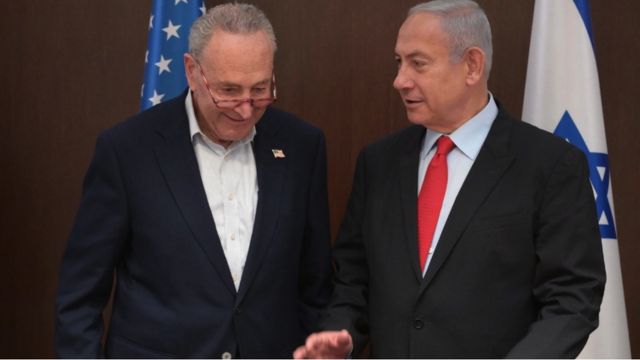Schumer supports his call for Israel to get rid of Netanyahu when he meets with Jewish leaders from the US
In a recent meeting with executives from major American Jewish organizations, US Senate Majority Leader Chuck Schumer addressed the controversy surrounding his call for early elections in Israel to replace Prime Minister Benjamin Netanyahu. The meeting held on Tuesday was aimed at clarifying Schumer’s stance following a speech that sparked widespread debate and criticism.
During the virtual meeting, Schumer firmly stood by his remarks, shedding light on his deep-seated concerns about Israel’s current trajectory under Netanyahu’s leadership. Despite facing accusations of meddling in Israel’s domestic affairs, especially from Netanyahu and Republican figures, Schumer emphasized his enduring commitment to Israel’s well-being and sovereignty.
The speech in question, delivered on the Senate floor, had resonated through political spheres, marking Schumer as the highest-ranking Jewish member in the history of the US Congress to openly criticize Israel’s government policies. His comments reflected a broader debate on the nature of US-Israel relations, particularly concerning the leadership and policies of Netanyahu.
- Auto Insurance Shopping Rises in Response to Soaring Insurance Rates: Report
- Avoid These 7 Missteps When Refinancing to a Lower Mortgage Rate
- Rising Home Prices Amid Slight Mortgage Rate Dip: Analysis
- Fresno County’s Groundbreaking Initiative: $500 Monthly Payments in New Guaranteed Income Program, Here is Who is Eligible
- Unlocking Financial Freedom: 5 Reasons to Opt for Personal Loans in Credit Card Debt Repayment
Schumer, known for his staunch pro-Israel stance, clarified that his call for a change in leadership was not an indictment of Israel itself but a critique of Netanyahu’s governance.
In his narrative, he drew a distinction between his love for the country and his concerns about the direction under Netanyahu, particularly highlighting the empowerment of far-right leaders and policies he believes are harmful to Israel’s future.
- Will Everyone Get a $12,000 Stimulus Check in 2024? Find Out Eligibility
- $6400 Stimulus Checks in 2024: What You Need to Know About Eligibility and Payment Dates
- IRS 4th Stimulus Check 2024: Comprehensive Guide to Eligibility and Payment Dates
- 3 Smart Moves to Make Once Your Savings Reach $50,000, Here Are Crucial Actions to Take
- 3 Effective Ways to Pay Off Student Loans on a $50K Salary or Less, Know Here!
The Senate Majority Leader’s approach to the speech was meticulous, involving two months of preparation and ten drafts, all while keeping the White House informed to avoid conflict with ongoing negotiations in Gaza.
He expressed that although his statements could have political repercussions, his conscience compelled him to speak out against what he perceives as a dangerous path for Israel.
Amid the backlash, Schumer reiterated that his criticism was not equating Netanyahu to Hamas, the primary obstacle to peace in his view, but instead highlighting various factors contributing to the current deadlock. He underlined that his objective was not to dictate the Israeli electoral process but to urge a reevaluation of policies detrimental to peace and Israel’s global standing.
The discussion also touched on the use of American leverage, a contentious point among the Jewish community leaders. While Schumer reassured that he did not intend to condition US defense assistance, he mentioned the possibility of a more active role in shaping Israeli policy should current trends continue.
This conversation reflects a pivotal moment in US-Israel relations, as seen through the lens of one of the most influential Jewish figures in American politics.
Schumer’s defense marks a significant chapter in the ongoing dialogue about democracy, foreign policy, and the future of a cherished ally. As tensions simmer and debates unfold, the political and communal response to Schumer’s remarks will undoubtedly shape the contours of US-Israel engagement in the times to come.











